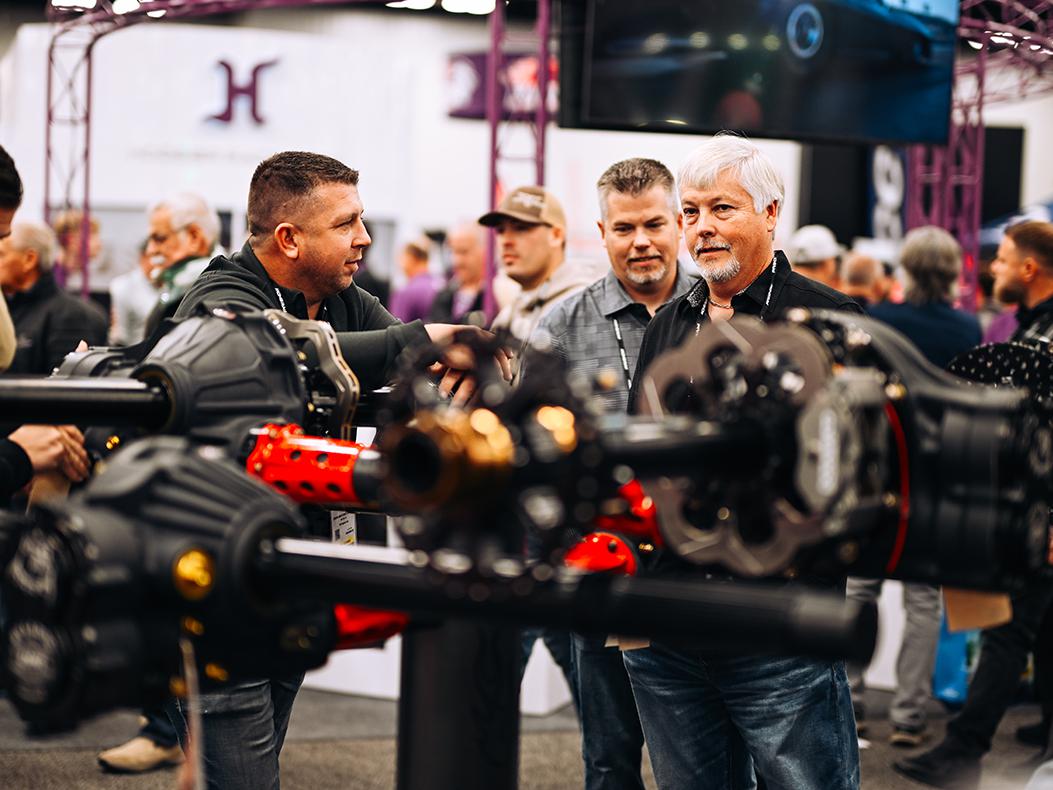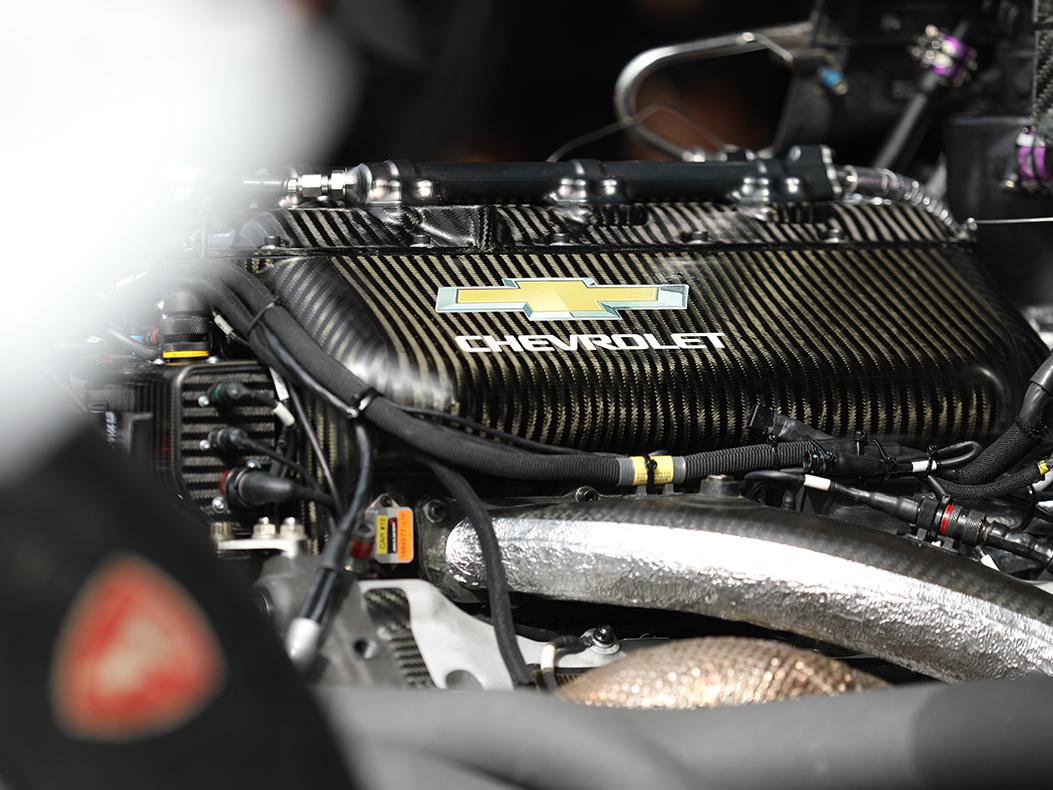No Backing Down

The RPM Act weaving its way through Congress is essential legislation to save our sport. Here’s how industry stakeholders are giving the bill a boost.
Here’s a story that has played out countless times across America: A Camaro (or Mustang, or Supra, or…) that has served dutifully as a go-to-work car starts looking a bit ragged around the edges, and repair bills start mounting up. It’s not so valuable as daily transportation anymore, but the owner, in a flash of inspiration, realizes it would make a great race car. He dives in, tears it apart and rebuilds it with all the best race parts. That old Camaro takes on a second life as a dedicated track warrior.
Sounds like the most normal thing in the world, right?
Not if the Environmental Protection Agency (EPA) has its way.
In recent years, the EPA has adopted a radical interpretation of the Clean Air Act that states, “An EPA-certified motor vehicle cannot become a nonroad vehicle even if it is used exclusively for competition because the definition of motor vehicle hinges on the purpose of its design and not its use.”

In other words, by bureaucratic decree the American tradition of retiring a street car and converting it strictly into a race car is now under assault, since that process requires removing emissions equipment. Nothing of the sort was ever passed into law by elected officials, but the agency has been aggressive in using this interpretation for enforcement actions against manufacturers and suppliers of high-performance parts.
For a shocking look at how such enforcements can impact an independent motorsports business, check out PRI President Dr. Jamie Meyer’s interview with Brent Leivestad, owner of PFI Speed in Fort Lupton, Colorado, posted on PRI’s YouTube channel (youtube.com/user/pritradeshow). PFI Speed was hit with a demand for records and later threatened with a $180,000 fine for allegedly selling illegal products—parts all installed on dedicated race cars—with no hearing, trial or even direct talks with EPA agents.


“When we’re able to sit down and talk to one of the victims of this government overreach, people in this industry see themselves in Brent,” Meyer said. “They relate to the story. They see his shop and they realize that’s their shop. They see his business decisions and they realize they make the same decisions every day. They start to realize this is real.”
If recent history is any indication, the EPA plans to keep the pressure on. “The EPA has been more aggressive over the last two years,” said Eric Snyder, Director, Congressional Affairs, for PRI. “We saw it at the end of the last administration, and the EPA has only continued to ramp up enforcement.”
Fighting Back
The EPA’s recent actions foreshadow a general trend from Washington, DC, toward “Green New Deal” type policies. It’s safe to say that everybody wants a clean environment, as racer and bureaucrat alike all breathe the same air. But the environmental impact of the motorsports industry is minuscule in the grand scheme of things, while the economic impact of government initiatives like this can be devastating to small businesses and jeopardize countless livelihoods.
Fortunately, there’s a way for the motorsports community to push back, and it’s continuing to gain momentum. The Recognizing the Protection of Motorsports Act (RPM Act) has been introduced in both the House and the Senate, and support for its passage is growing. The time for racers and industry members to speak up is now to push the RPM Act across the finish line. “We’ve made the RPM Act a strategic initiative in all our communications and all of our different channels,” said Meyer.

The RPM Act has been in front of Congress before, and let’s just say its passage has been an endurance race, not a sprint. But it is the rare bill that currently enjoys widespread bipartisan support. At this writing, the House bill (H.R.3281) has 117 cosponsors, and the Senate version (S.2736) has 22 cosponsors. Helping matters is that the RPM Act hasn’t been reduced to a polarizing left vs. right, Democrat vs. Republican split. “This issue is not political. We have members of both parties who’ve been really helpful on this issue,” said Snyder.
The RPM Act is also rare in its simplicity. H.R.3281, the House bill, reads, “Amending the Clean Air Act to add: ‘No action with respect to any device or element of design referred to in paragraph (3) shall be treated as a prohibited act under that paragraph if the action is for the purpose of modifying a motor vehicle into a vehicle that is not legal for operation on a street or highway and is to be used solely for competition.’”
“Support for the bill is really growing in Congress,” Snyder said. “That’s important because it’s something that congressional leadership and leadership on committees of jurisdiction pay attention to. They notice how many members are getting on the bill, how many Republicans, how many Democrats, and specifically they look at which members are joining. We’ve really been able to grow support on the Energy and Commerce Committee in the House, which is important because the committee has jurisdiction over the bill.”
Strength in Numbers
To give the bill the best chance of passage, it’s crucial that Congress hear from the motorsports community at large. For that to happen, people need to be informed. The reality is, most racers and shop owners have their heads down working on the next project, and political realities seem distant.
Fortunately, many people in the motorsports industry are taking the lead in raising awareness using a variety of methods. “We’ve been putting little cards that PRI provided to us in every shipment that explain it, that say ‘Support the RPM Act.’ We’ve hung banners in our shop. When we go to races, we hang a ‘Support the RPM Act’ banner on our tent,” said Heath Norton with Callies Performance Products, Fostoria, Ohio.
“A lot of these people just don’t see it, they don’t know about it,” Norton said. “If we can get the word in front of them and the message to them and get it going, we have a chance. But if they don’t know about it, we have no chance. We have to take it to where they are, where it’s meaningful to them. Have it at the track. Once it’s made real to them so they can see how it affects them, then it becomes meaningful.”
Justin Keith is founder and CEO of Killer Performance KC in Grain Valley, Missouri, as well as co-owner of the Street Car Takeover series that has a large grassroots following. “At our events we have our own announcer, and he comes to every single race with us. He has been talking about the RPM Act and things people can do to sign up with their senators in their state so they can be aware of the situation,” Keith said. “He goes over all that throughout the event several times a weekend. I feel like that has to do something. He’ll sit there and talk about it when we have an oil-down or in between classes when it’s quiet and everyone can hear it.”

Keith reported that the message is well received. “No one wants to see race cars go away, so if they’re there watching drag racing, obviously they’re going to continue to want to watch drag racing,” he said. “The enthusiasts that come to our events are a lot of younger people. They’re very passionate about keeping the sport alive so they can modify their cars and we’re not all driving RC cars around. I feel like it’s perceived very well.”
Alex Taylor is an Arkansas-based racer and car builder who has built a large social media following, including 158,000 followers on Instagram, 211,000 followers on Facebook and more than 91,000 subscribers to her YouTube channel. She has used these platforms to share the message about the RPM Act.
“The approach that I’ve taken toward it is not a negative, not the scare tactic. It’s been, ‘You love this industry, and I love this industry.’ I’ve taken the passion approach. ‘Here are the resources. Decide for yourself, but you have the chance now to make a difference,’” she said. “For the most part, from what I see from feedback on my side, people have had a positive response to me sharing the message. I can tell that people are concerned about it. I’ve seen a lot of the response as, ‘Why have we not talked about this previously?’ or ‘Why have I not heard about this?’”
As members of the racing community become more aware of the stakes, it’s vital they make their voices heard, from the grassroots all the way up to the corporate boardroom. “It’s a constant battle,” said Callies’ Norton. “You’re arguing for time. You’re trying to get them to pay attention to you. Honestly, I think one of the best things is for guys like me, who are owners, to use our influence on some of these guys. It’s great that the masses are doing it because then it helps echo what we say. But we need the owners and the people who can explain to the congressmen, ‘If you want my support, you better support this, because there are a lot of people who work for me in your district. You want them to support you, too.’ Just be forceful about it. We’ve had some luck. We’ve been reaching out and working with congressmen and their aides and trying to get them to understand the jobs side of it. Because it’s easy to say, ‘Oh it’s just racing, it’s just a dumb sport.’ But when we talk about the jobs, it really matters. The jobs are the key thing.”

Street Car Takeover’s Keith reiterated the importance of Congress understanding how many jobs are at stake. “If we weren’t putting on those races, that affects restaurants, that affects hotels, plane tickets, all this little stuff people don’t think the motorsports industry affects, it affects in a big way,” he said. “For instance, when we have our event in Charlotte, we sell out every single hotel room in a 10-mile radius around the track. That’s a big deal. People have to eat, people have to go to the gas stations, people have to go to Walmart and get stuff for the track.”
The Washington clamp-down, if it were to intensify, could have ripple effects that quickly inundate the industry. “It’s not just tuning, it’s not just some of these smaller segments of the industry, it’s everything,” Norton said. “If you can’t race a race car, you don’t need a lot of the hard parts that a lot of us make. That’s a lot of jobs. I don’t think people understand how many jobs will be lost because of this. The industry is large, it is wide, and it is deep. There are a lot of people that make money off of this sport, more than people think.”
Getting There
More people have spoken out recently than ever before on this issue, and the effort is making a difference. “What sticks out more than anything is companies that have stepped up over the past year,” PRI’s Snyder explained. “A few companies that have been the target of EPA visits or enforcement have been telling their stories, not just hiding in the shadows. When you have a business owner who is willing to share their experience, that resonates with others in the industry. These are good, hard-working people who are just trying to run their businesses. It’s pretty jarring getting a visit from EPA or receiving a letter in the mail saying you’re going to be fined for simply operating a race parts business.
“People in the industry understand that working with Congress isn’t an easy thing and that legislative victories don’t come quickly,” Snyder continued. “Enthusiasts and the men and women who work in the industry have done an incredible job of continuing to write letters to keep this issue in front of lawmakers. That’s important. Our strength is in numbers. We have a huge community of more than eight million people who are race enthusiasts or are into modding vehicles, restoring classic cars and going off-road. We’re focused on getting those eight million people speaking with one voice to protect racing.”
There is more than one path to success for the RPM Act. Passage of a stand-alone bill that is subsequently signed into law would be ideal, but often such legislation is folded into larger bills, such as funding for transportation or infrastructure projects. For either to happen, Congress has to hear from the motorsports community.
“The challenge is that every Congress sees thousands of bills from groups of people who are just as dedicated to their cause as racers are to their lifestyle,” Meyer said. “We have seen an increased interest by lawmakers given the number of letters that have been sent to representatives.”
“We’ve had more than a million and a half people write Congress in the last year, and lawmakers have noticed the uptick in pressure,” Snyder said. “There’s even more excitement for getting this done within the racing community than any session before. Members of Congress understand the importance of the RPM Act, which is reflected in the bill’s growing support on Capitol Hill, but we must continue to remind them that the job isn’t done until the RPM Act is signed into law.”
PAC Pick
One way to join the fight is to contribute to the Performance Racing Political Action Committee (PAC). One hundred percent of the contributions received by the PAC go toward supporting the candidates and lawmakers that support racing. “If you think about the PRI Show and how we have come together every year for 33 years at a trade show, it’s a natural extension of the brand, it’s a natural extension of the services our team has offered,” said PRI President Dr. Jamie Meyer. “Having a strong PRI membership is certainly how we’re going to get the RPM Act passed, but also protect the racing industry well into the future.” For information and quick links on how to contact representatives and senators, along with ready-to-send messages, go to saveourracecars.com. —Steve Statham
 MEMBERSHIP LOGIN
MEMBERSHIP LOGIN JOIN PRI
JOIN PRI


